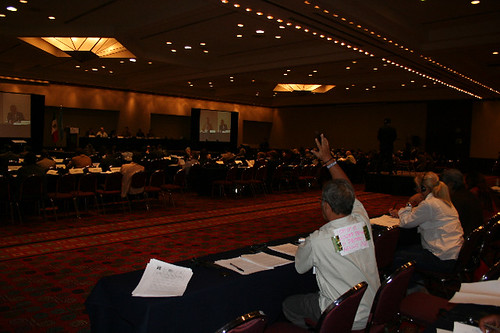
Filipino farmer ends 3-day hunger strike
Guadalajara, Mexico, March 4, 2010 — The Filipino farmer who went on hunger strike during the FAO biotech conference in Guadalajara, Mexico City being held on March 1-4, 2010, ended his protest action on March 4, 2010, the last day of the conference.
“It’s over. I will be flying home early tomorrow to hug my family. I also miss my ducks, my garden and my rice farm, which was hit by El Nino,” Isidoro “Boy” Ancog, an organic farmer from Bohol, Philippines, wrote in an e-mail sent to his friends and supporters in the Philippines.
Ancog announced the end of his hunger strike during the last day of the conference, where the conference report was to be adopted.
“[…] I formally lift my hunger strike. But rest assured that we will continue with our advocacy of producing safe and healthy food in our fields, which we will all enjoy, as one people,” he said in his speech.
Ancog made his intervention when reference was made to the paragraph 24 of the report, which states that “A representative from civil society expressed concern that biotechnologies would be imposed on farmers in developing countries and could adversely impact the livelihoods of small holder farmers.”
(Photo by Ditdit Peligrina)
The paragraph was rephrased to state that “GMOs should not be imposed on farmers in developing countries, especially those that will adversely impact on the livelihoods of small holder farmers.”
“I would like again to express my deepest thanks to the organizers and to FAO for inviting me here. It is unusual for us farmers to be invited to a conference like this, and be accorded the space to say what I have to say,” Ancog said.
“But the conference report, did not even express the points I raised in this conference. I am a farmer, representing a regional federation of farmers, fisherfolks, rural women and indigenous peoples in Asia. I expressed that biotechnologies particularly GMOs are being imposed on us farmers, right now in our farms. And that GMOs have negative impacts on our livelihoods as small holder farmers and organic agriculture practitioners. GMOs does not allow us to take control of our own resources. It fails to recognize our capacities to innovate. It is an insult to our way of life,” he added.
Furthermore, he called on the FAO to “convene an international meeting of peasant farmers, fisherfolks, rural women and indigenous peoples to discuss about the results of this conference, but primarily to examine the appropriateness and implications of biotechnology, particularly GMOs in our lives and allow us to decide for ourselves the courses of actions to take.”
“Beyond these walls, poverty and hunger still exist. Beyond these walls, peasant farmers, fisherfolks, rural women and indigenous peoples continue to be neglected and ignored in decision making processes and technology development processes. Am calling on delegates and FAO to address this gap,” Ancog said.
Ancog went on hunger strike on the second day of the 10th FAO international technical conference entitled “Agricultural biotechnologies in developing countries: Options and opportunities in crops, forestry, livestock, fisheries and agro-industry to face the challenges of food insecurity and climate change (ABDC-10).
ABDC-10 is hosted by the Government of Mexico and co-sponsored by the International Fund for Agricultural Development (IFAD), the Consultative Group on International Agricultural Research (CGIAR), the Global Forum on Agricultural Research (GFAR), the International Centre for Genetic Engineering and Biotechnology (ICGEB) and the World Bank are major partners in this initiative.
Participants to the conference are from delegations of Member States of FAO; from the United Nations and its specialized agencies; other intergovernmental organizations; international non-governmental organizations and international civil society organizations; the conference Steering Committee; as well as invited speakers and panelists at the conference.
Ancog is representing the Pambansang Kilusan ng mga Samahang Magsasaka (PAKISAMA), a national confederation of small farmers, marginal fishers, rural women, indigenous peoples and rural youth in the Philippines, as well as the Asian Farmers’ Association for Sustainable Rural Development (AFA), a regional organization of 9 national farmers’ federations from 8 countries in Asia, representing more than 10 million small scale men and women farmers.
Contact:
Boy Ancog
boy_ancog@yahoo.com
Ditdit Peligrina
ditdit_pelegrina@searice.org.ph
Esther Penunia
afaesther@asianfarmers.org
Asian Farmers’ Association for Sustainable Rural Development (AFA)
Rm 206, Partnership Center Building
59 C. Salvador Street, Loyola Heights
Quezon City, Philippines 1108
Tel/Fax: (+632)436-4640
E-mail: afa@asianfarmers.org
URL: www.asianfarmers.org
###



Comments are closed